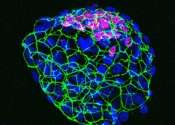Opioid dependence remains high but stable in Scotland, new surveillance report finds
Opioid dependence in Scotland remains high but largely stable, according to a new University of Bristol-led analysis published in Addiction. The study is the first to estimate the number of people dependent on opioid drugs ...
10 hours ago
0
0









